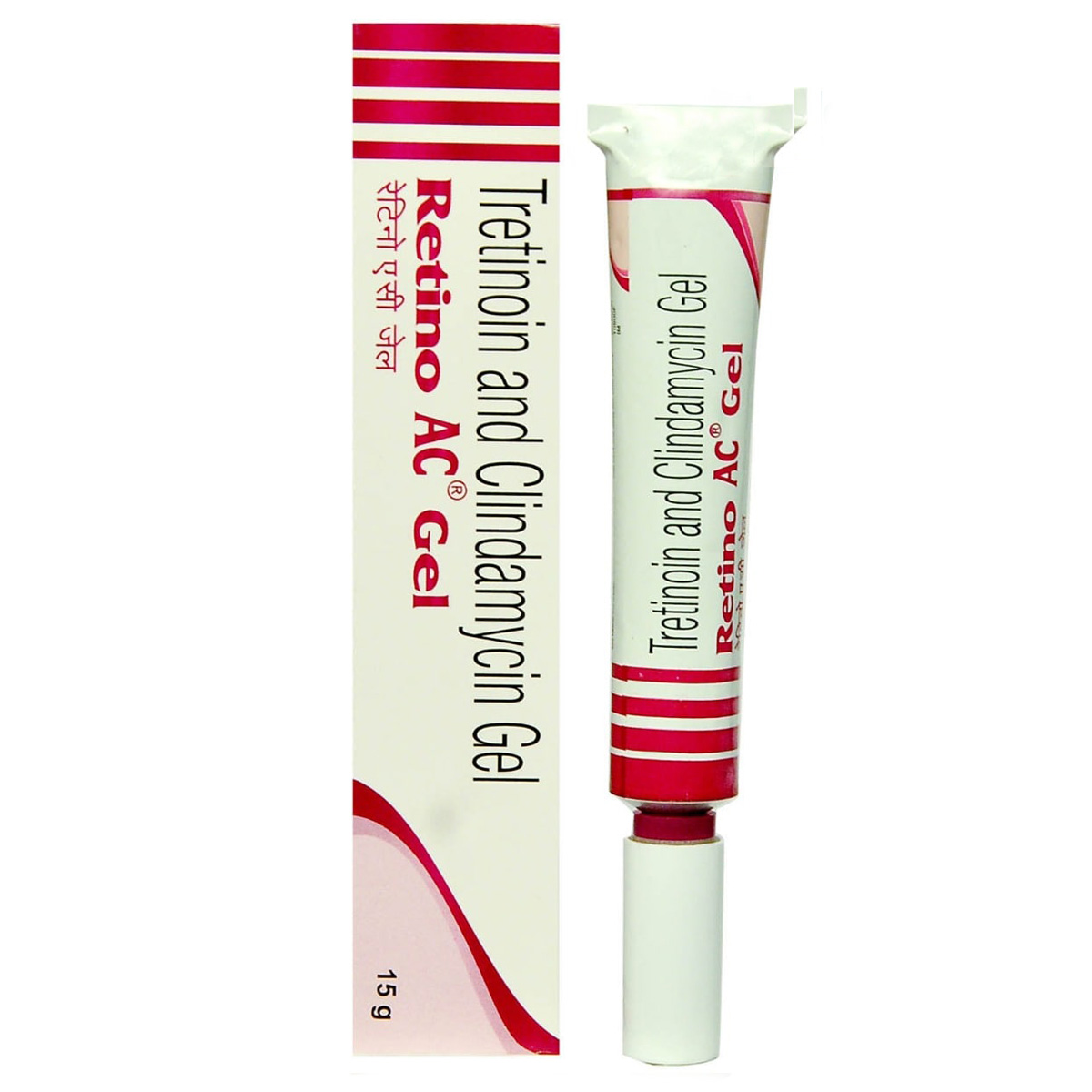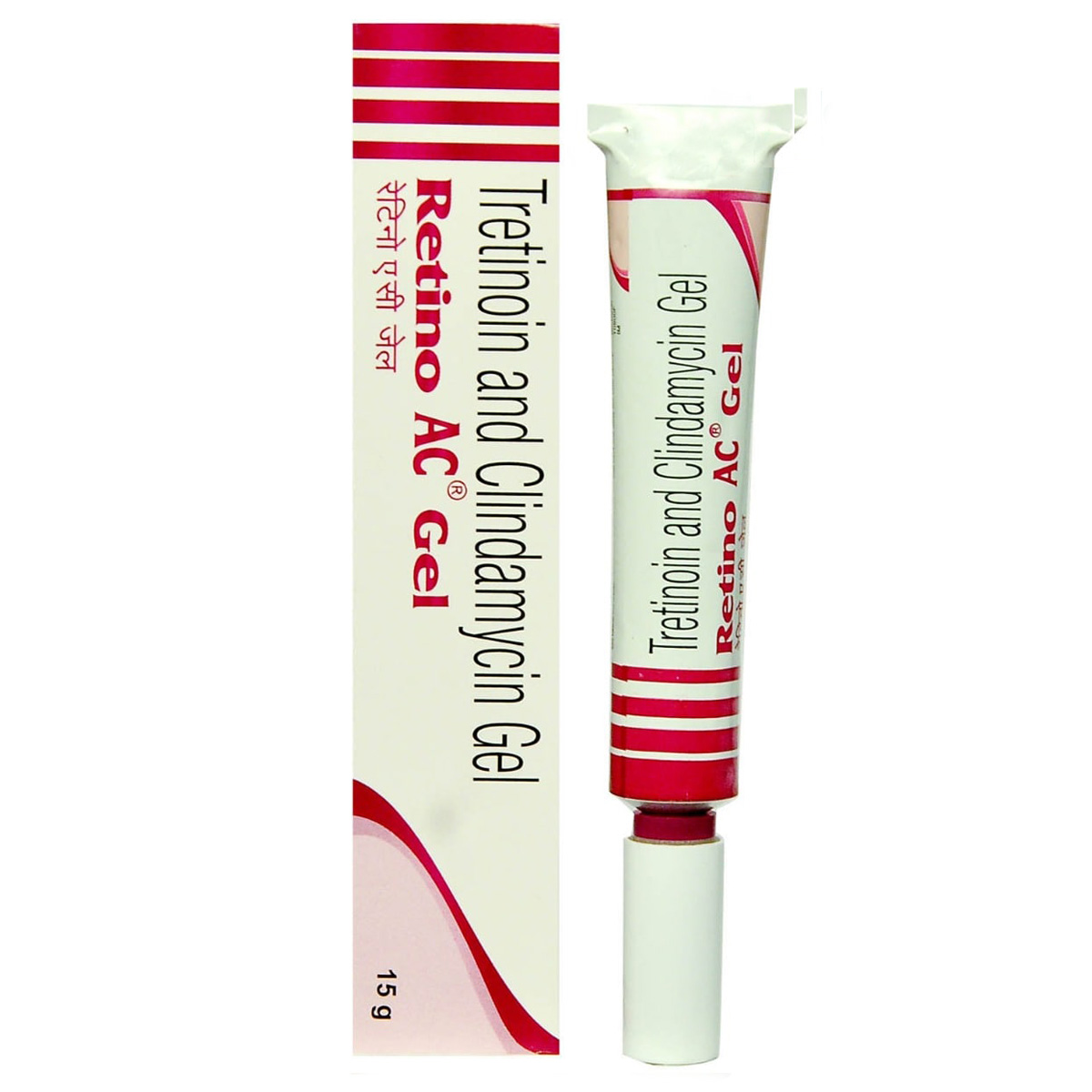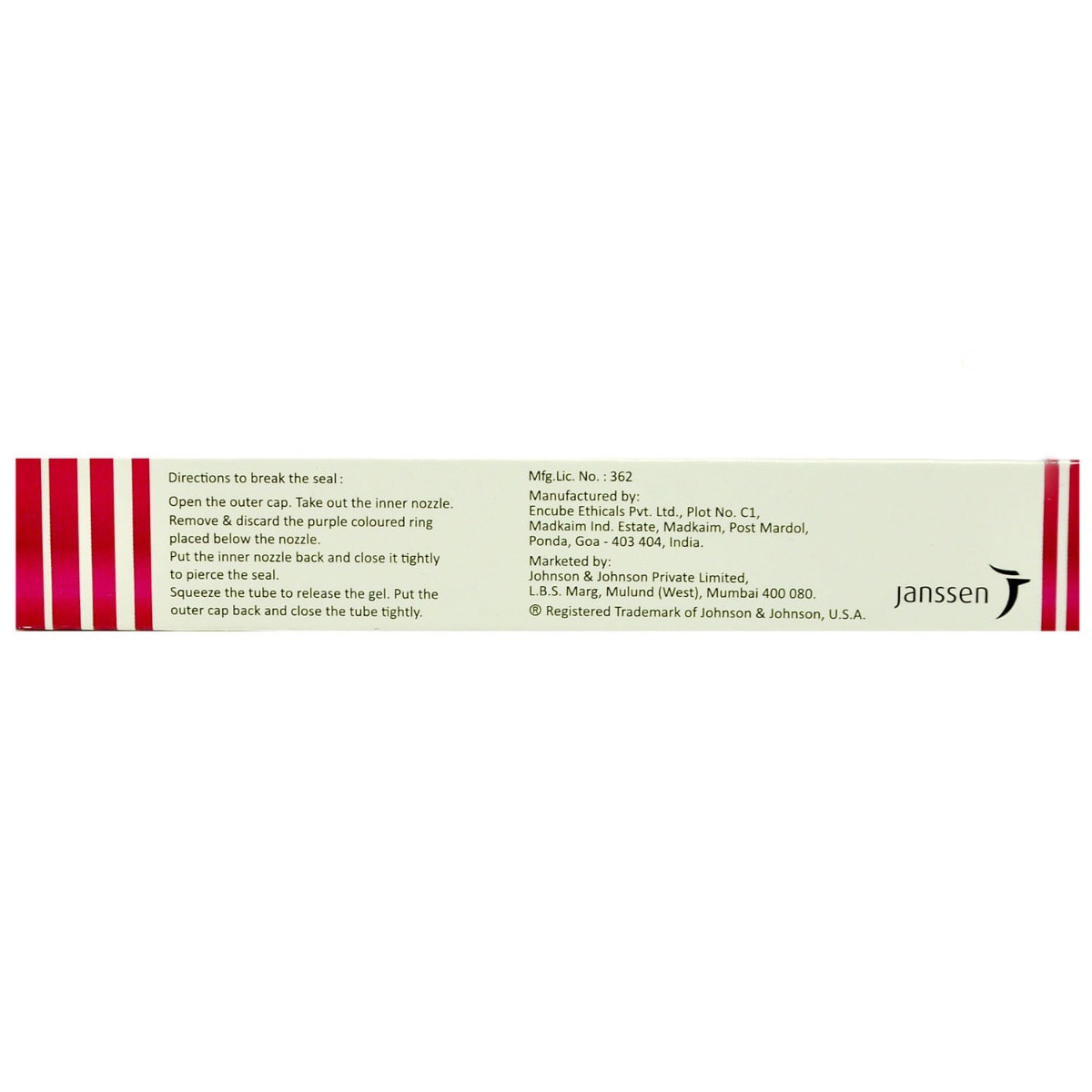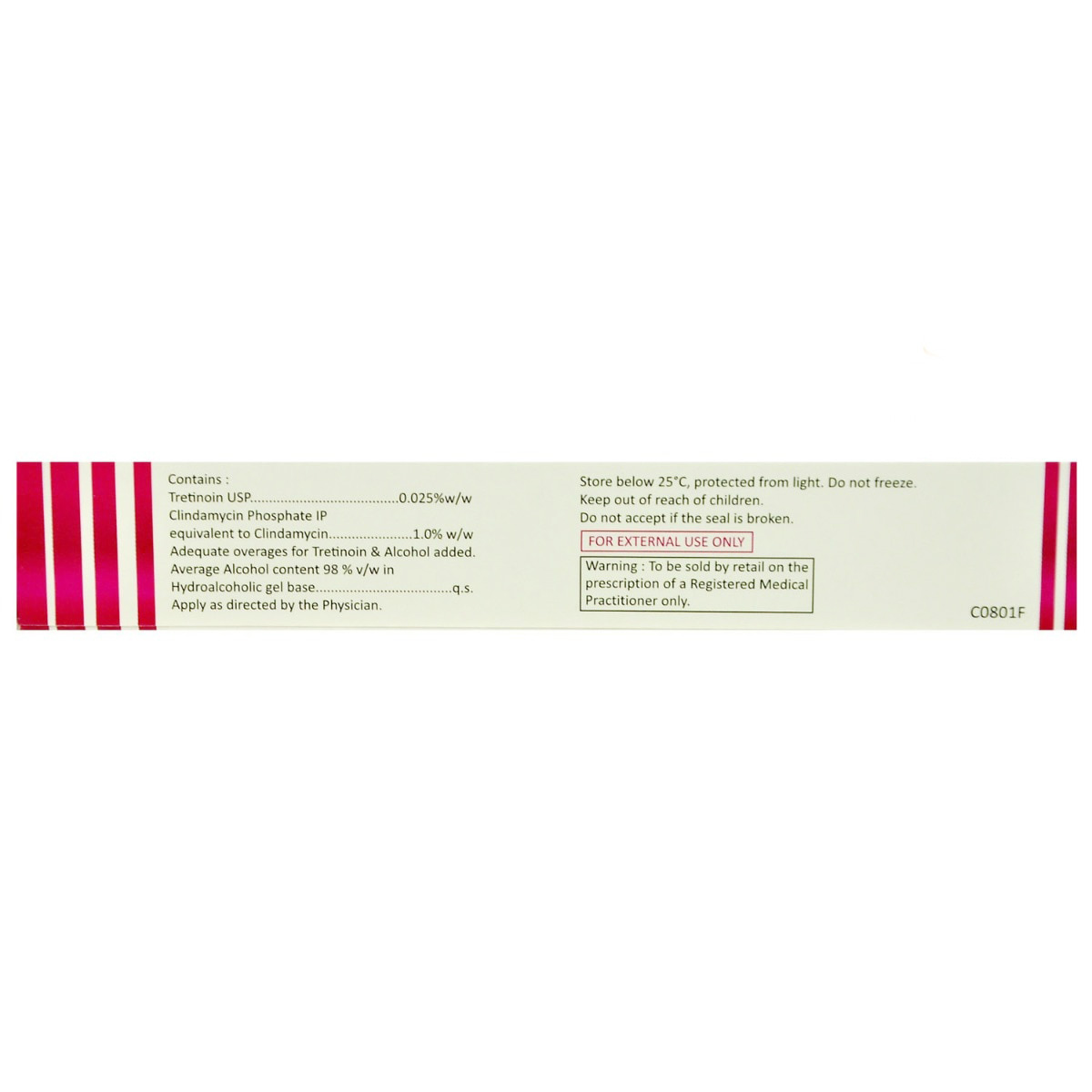Retino Ac Gel
MRP ₹372
(Inclusive of all Taxes)
₹55.8 Cashback (15%)




Available Offers
Therapeutic Class
Drug-Drug Interactions Checker List
- ERYTHROMYCIN
- METRONIDAZOLE
- WARFARIN
- SALICYCLIC ACID
- BENZOYL PEROXIDE
- ATRACURIUM
- CISATRACURIUM
Drug-Drug Interactions
Drug-Drug Interactions
Login/Sign Up
Drug-Food Interactions
Drug-Food Interactions
Login/Sign Up
Drug-Diseases Interactions
Drug-Diseases Interactions
Login/Sign Up
Drug Warnings
If you are known to be allergic to Retino Ac Gel or any other medicines, please tell your doctor. If you have a chronic inflammatory bowel disease (e.g. Crohn’s disease or ulcerative colitis). If you are suffering from other acute inflammatory conditions of the skin (e.g. folliculitis), especially around the mouth (perioral dermatitis). Avoid sun exposure while using Retino Ac Gel as it may make the skin more sensitive to sunlight and cause sunburn. Wear protective clothing and use sunscreen while going out to protect your skin from sunburn. If you have a history of colitis (chronic digestive disease) with past antibiotic use which is characterized by prolonged or significant diarrhoea or abdominal cramps. Do not apply Retino Ac Gel to cuts, open wounds, broken, sunburnt, or sensitive skin areas. Avoid sun exposure while using Retino Ac Gel as it may make the skin more sensitive to sunlight and cause sunburn. Wear protective clothing and use sunscreen while going out to protect your skin from sunburn. If you have intestine problems or eczema, please inform your doctor before taking Retino Ac Gel. If you are pregnant or breastfeeding, please inform your doctor before taking Retino Ac Gel.
Side Effects of Retino Ac Gel
- Application site reactions (burning, irritation, itching and redness)
- Dermatitis
- Skin peeling
- Dryness
Directions for Use
Medicinal Benefits Mweb
Medicinal Benefits
Retino Ac Gel is a combination of two medicines, namely: Tretinoin (vitamin A) and Clindamycin (antibiotic) primarily used to treat acne (pimples). Tretinoin is a form of vitamin A that reduces oil production in the skin, replenishes the skin, and helps keep your pores open. Clindamycin belongs to the class of antibiotics that inhibits the production of essential proteins that are necessary for bacteria to grow, multiply, and increase in numbers. Altogether it stops or slows down the growth of bacteria and prevents the growth of acne.
Uses of Retino Ac Gel
About Retino Ac Gel
Retino Ac Gel belongs to the class of dermatological preparations called 'antiacne' used to treat acne (pimples). Acne is a common skin condition and occurs when hair follicles are blocked with dead skin cells and oil. The acne-causing bacteria feeds on sebum (natural oil produced by skin) causing redness and swelling.
Retino Ac Gel is a combination of two medicines, namely: Tretinoin (vitamin A) and Clindamycin (antibiotic). Tretinoin is a form of vitamin A that reduces oil production in the skin, replenishes the skin, and helps keep your pores open. Clindamycin belongs to the class of antibiotics that inhibits the production of essential proteins that are necessary for bacteria to grow, multiply, and increase in numbers. Altogether it stops or slows down the growth of bacteria and prevents the growth of acne.
Take Retino Ac Gel as prescribed by your doctor. You are advised to take Retino Ac Gel for as long as your doctor has prescribed it for you depending on your medical conditions. You may experience application site reactions (burning, irritation, itching, and redness), dermatitis, skin peeling, and dryness. Most of these side effects of Retino Ac Gel do not require medical attention and gradually resolve over time. However, if the side effects are persistent, reach out to your doctor.
If you are known to be allergic to Retino Ac Gel or any other medicines, please tell your doctor. If you have a chronic inflammatory bowel disease (e.g. Crohn’s disease or ulcerative colitis). If you are suffering from other acute inflammatory conditions of the skin (e.g. folliculitis), especially around the mouth (perioral dermatitis). If you have a history of colitis with past antibiotic use which is characterized by prolonged or significant diarrhoea or abdominal cramps. Do not apply Retino Ac Gel to cuts, open wounds, broken, sunburnt, or sensitive skin areas. Avoid sun exposure while using Retino Ac Gel as it may make the skin more sensitive to sunlight and cause sunburn. Wear protective clothing and use sunscreen while going out to protect your skin from sunburn. If you have intestine problems or eczema, please inform your doctor before taking Retino Ac Gel. If you are pregnant or breastfeeding, please inform your doctor before taking Retino Ac Gel.
Online payment accepted
know your delivery time
Provide Delivery Location
Therapeutic Class
All Substitutes & Brand Comparisons
RX
Cligel T Gel 15 gm
East West Pharma India Pvt Ltd
₹138
(₹8.28/ 1gm)
62% CHEAPERRX
Out of StockKeralyte-C Gel 15 gm
Armour Remedies India Ltd
₹182.5
(₹10.95/ 1gm)
50% CHEAPER
- Consult your doctor if you experience skin redness, itching, or irritation after taking medication.
- Your doctor may adjust your treatment plan by changing your medication or providing guidance on managing your erythema symptoms.
- Your doctor may recommend or prescribe certain medications to help alleviate symptoms.
- Apply cool compresses or calamine lotion to the affected skin area to reduce redness and itching.
- Stay hydrated by drinking plenty of water to help alleviate symptoms and keep your skin hydrated.
- Monitor your skin condition closely and promptly report any changes, worsening symptoms, or concerns to your healthcare provider.
- Moisturize frequently with thick, broad-spectrum moisturizers containing sunscreen.
- Use warm water for short baths, and gentle cleansers.
- Pat dry and apply moisturizer immediately.
- Use a humidifier to add moisture to the air, and choose breathable fabrics like cotton and silk.
- Wash clothes with fragrance-free detergents to minimize irritation.
- Sunburns can occur commonly. Cover the area that is affected to avoid extended exposure.
- Apply a clean, dampened towel to the affected skin for relief.
- Take a cool bath by adding baking soda to water.
- Sleep well and give enough rest to your body.
- Take a balanced diet that heals the allergy or burns.
- Apply a skin-calming lotion, gel or moisturiser frequently.
- After taking a shower or bath, apply a moisturizer to damp skin.
- Use petroleum jelly or other thick emollients.
- Use a hypoallergenic, fragrance-free moisturizer 2 to 3 times a day or as frequently as required.
- Exfoliate your skin gently using a pumice stone or slightly abrasive sponge.
- Do not scrub your skin.
- Avoid hot showers or baths. Instead take short, warm showers or baths.
- Use mild soap or skin cleansers with added moisturizer.
- Drink lots of water.
- Use sunscreen and wear protective clothing while going out to protect yourself from sun damage.
- Burning sensation is an abnormal side effect that needs medical attention. To relieve the burning feeling, your doctor may prescribe painkillers or antidepressants.
- Focused exercises can improve strength and reduce burning by soothing muscles.
- Change in lifestyle and improving nutrition can reduce the causes of burning sensation and provide relief.
- Your doctor may suggest nerve block injections as it is related to sensation in the skin.
- Burning feeling in a specific area would need mild electrical currents to reduce pain that targets the nerve affected. This practice must be done only if your doctor mentions it.
- Report the itching to your doctor immediately; they may need to change your medication or dosage.
- Use a cool, damp cloth on the itchy area to help soothe and calm the skin, reducing itching and inflammation.
- Keep your skin hydrated and healthy with gentle, fragrance-free moisturizers.
- Try not to scratch, as this can worsen the itching and irritate your skin.
- If your doctor prescribes, you can take oral medications or apply topical creams or ointments to help relieve itching.
- Track your itching symptoms and follow your doctor's guidance to adjust your treatment plan if needed. If the itching persists, consult your doctor for further advice.

Have a query?
Verified Buyers Reviews
Side Effects
- Redness Of The Skin
- Dryness
- Sunburn
- Skin Peeling In Large Pieces
- A Burning Feeling In A Specific Area
- Itching
If any of the above side effects continue or intensify, seek medical advice. Professional guidance may be necessary for appropriate care and treatment adjustments.
Buy best Dermatology products by
Glenmark Pharmaceuticals Ltd
Sun Pharmaceutical Industries Ltd
Klm Laboratories Pvt Ltd
Cipla Ltd
Canixa Life Sciences Pvt Ltd
Abbott India Ltd
Ajanta Pharma Ltd
Intas Pharmaceuticals Ltd
Dr Reddy's Laboratories Ltd
East West Pharma India Pvt Ltd
Alkem Laboratories Ltd
Atopic laboratories Pvt Ltd
Hegde & Hegde Pharmaceutica Llp
Brinton Pharmaceuticals Ltd
Torrent Pharmaceuticals Ltd
Amwill Healthcare Pvt Ltd
Leeford Healthcare Ltd
Palsons Derma Pvt Ltd
Oaknet Healthcare Pvt Ltd
Med Manor Organics Pvt Ltd
Micro Labs Ltd
Dermocare Laboratories Gujarat Llp
Fixderma India Pvt Ltd
Apex Laboratories Pvt Ltd
Mankind Pharma Pvt Ltd
Ipca Laboratories Ltd
Yaher Pharma
Systopic Laboratories Pvt Ltd
Menarini India Pvt Ltd
Ethinext Pharma
Nemus Pharmaceuticals Pvt Ltd
Skinocean Pharmaceuticals
Dermacia Healthcare
Inex Medicaments Pvt Ltd
Lupin Ltd
GlaxoSmithKline Pharmaceuticals Ltd
Talent India Pvt Ltd
Zydus Cadila
Kivi Labs Ltd
Zydus Healthcare Ltd
Hbc Dermiza Healthcare Pvt Ltd
Mrhm Pharma Pvt Ltd
Regaliz Medicare Ltd
Sol Derma Pharmaceuticals Pvt Ltd
Newtrimed Healthcare Pvt Ltd
Wallace Pharmaceuticals Pvt Ltd
Eskon Pharma
Glowderma Lab Pvt Ltd
La Pristine Bioceuticals Pvt Ltd
Mohrish Pharmaceuticals Pvt Ltd
Percos India Pvt Ltd
Rockmed Pharma Pvt Ltd
Macleods Pharmaceuticals Ltd
Praise Pharma
Ethicare Remedies Pvt Ltd
Kaizen Drugs Pvt Ltd
Aurel Biolife
Rely On Pharmaceuticals
Wockhardt Ltd
Galcare Pharmaceuticals Pvt Ltd
Elder Pharmaceuticals Ltd
Indiabulls Pharmaceuticals Pvt Ltd
La Med Healthcare Pvt Ltd
Biocute Life Care
Yap Bioceuticals
Yash Pharma Laboratories Pvt Ltd
Zee Laboratories Ltd
Apple Therapeutics Pvt Ltd
Adonis Laboratories Pvt Ltd
Albatross Healthcare Pvt Ltd
Galderma India Pvt Ltd
Prism Life Sciences Ltd
FDC Ltd
Alniche Life Sciences Pvt Ltd
Salve Pharmaceuticals Pvt Ltd
West Coast Pharmaceuticals Pvt Ltd
Dermarex HealthCare India Pvt Ltd
Arka Vital Science Pvt Ltd
Dermajoint India
Gary Pharmaceuticals Pvt Ltd
Grace Derma Healthcare Pvt Ltd
Karlin Pharmaceuticals & Exports Pvt Ltd
Skinska Pharmaceutica Pvt Ltd
Uniza Healthcare Llp
Alembic Pharmaceuticals Ltd
Cadila Healthcare Ltd
Cadila Pharmaceuticals Ltd
Cosmofix Technovation Pvt Ltd
Human Pharmaceuticals
Indolands Pharma Pvt Ltd
Lyra Laboratories Pvt Ltd
Akumentis Healthcare Ltd
Entod Pharmaceuticals Ltd
Iceberg Health Care Pvt Ltd
Jenburkt Pharmaceuticals Ltd
P and P Dermaceuticals Pvt Ltd
Dabur India Ltd
Indchemie Health Specialities Pvt Ltd
Olcare Laboratories Pvt Ltd
Unison Pharmaceuticals Pvt Ltd
BODY CREAM
Body Lotion
Face Cream
Shampoo
Sun Screen
Face Gel
Soap
Face Wash
HAIR SOLUTION
Face Serum
BODY GEL
Hair Lotion
Hair Serum
Dusting Powder
ANTISEPTIC
FACE CLEANSER
Face Lotion
Body Wash
Body Spray
Eye Cream
FUNGAL INFECTION
Foot Cream
Conditioner
Eye Gel
Cleanser
Hair Cream
Hair Oil
Face Mask
Hair Gel
Sanitizer
Hair Spray
Moisturiser
Skin Ointment
Lip Balm
Capsule
Eye Serum
Intimate Wash
Specialty Supplements
Hand Cream
Facial Spray
SPECIALITY SUPPLEMENT
Face Toner
MEDICATED SHAMPOO
Tablet
Talcum Powder
BABY SUNSCREEN
Body Butter
Body Scrub
DIAPER RASH CREAM
EYE SOLUTION
FACIAL WIPE
Gargle
Hand Wash
Intimate Spray
Lip Serum
Lubricant Gel
MEDICATED CREAM
Nail Polish
VITAMIN D





